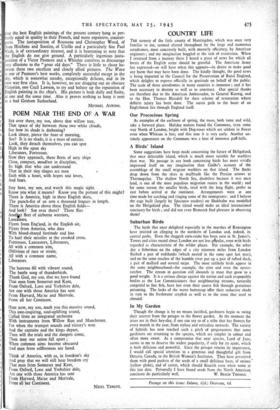COUNTRY LIFE
THE scenery of the little county of Huntingdon, which was once very familiar to me, seemed altered throughout by the large and numerous aerodromes, most concretely built, with masterly efficiency, by American engineers ; and my imagination boggled at the task of restoration. When I returned from a journey there I heard a piece of news for which all lovers of the English scene should be grateful. The American Army has expressed—or will have when this appears—its desire to make good any harm that may have been done. The kindly thought, the good news is being imparted to the Council for the Preservation of Rural England, which delights to express officially its gratitude on behalf of the public. The scale of these aerodromes in many counties is immense ; and it has been necessary to destroy as well as to construct. Our special thanks are therefore due to the American Ambassador, to General Koenig, and to the Hon. Thomas Blaisdell for their scheme of restoration where definite injury has been done. The surest path to the heart of an Englishman lies through England itself.
Our Precocious Spring
As examples of the earliness of spring, the roses, both tame and wild, take a forward place. Holiday makers found the Commons, even some way North of London, bright with Dog-roses which are seldom in flower even when Whitsun is late; and this year it is very early. Another un- timely appearance on the Commons was a host of immense puff-balls.
A Birds' Island
Some suggestions have been made concerning the future of Heligoland, that once delectable island, which is much more suitable for warblers than war. No passage in any book concerning birds has more vividly impressed itself on my imagination than Gadke's account of the assemblage of the small migrant warblers on that island. The flocks drop down from the skies in multitude like the Persian arrows at Thermopylae. The shallow North Sea, doubtless because it was once land, is one of the most populous migration routes in the world ; and for some reason the smaller birds, tired with the long flight, prefer to rest before arrival at the continent. Arrangements were at one time made for catching and ringing some of the immigrants: and I believe the cage built (largely by Spectator readers) on Skokholm was modelled on the Heligoland plan. The island would make an ideal international sanctuary for birds ; and did not even Bismarck find pleasure in observing them?
Suburban Birds
The birds that once delighted especially in the marshes of Kensington have insisted on clinging to the outskirts of London and, indeed, its central parks. Even the sluggish corn-crake has been seen in St. James's. Towns and cities round about London are not less pdpular, even with birds regarded as characteristic of the wilder places. For example, the other day a fisherman on the edges of a city nineteen miles from London flushed a pair of redshanks (which nested in the same spot last year), and on the same reaches of the humble river put up a pair of tufted duck, a pair of mallard and several snipe. The most unlikely birds appear in the same neighbourhood—for example, the stint and even the oyster- catcher. The stream in question still abounds in trout that grow to a good weight. It is a serious charge against the nation and such responsible bodies as the Lee Commissioners that neighbouring streams, naturally congenial to fine fish, have lost even their coarse fish through gratuitous poisoning. The locks of the water buttercup offer their seductive shade in vain to the freshwater crayfish as well as to the trout that used to abound.
In My Garden
Though the change is by no means justified, gardeners begin to swing their interest from the potager to the flower garden. At the moment the irises are in their hey-day, if one can say so of a tribe that has flowers for every month in the year, from stylosa and reticulata onwards. The variety of hybrids has now reached such a pitch of gorgeousness that some gardeners are returning to the species, which are simpler in colour and often more sweet. As a compromise that near species, Lord of June, seems to me to deserve the widest popularity, if only for its scent, which is both delicious and powerful. Since the potager retains its importance, I would call special attention to a generous and thoughtful gift from Ontario, Canada, to the British Women's Institutes. They have presented them with good packets of the seeds of a small delicious bean, of onions (yellow globe), and of carrot, which should flourish even when sown at this late date. Personally I have found seeds from the North American Postage on this issue: Inlana, Ifd.; Overseas, td.


























 Previous page
Previous page